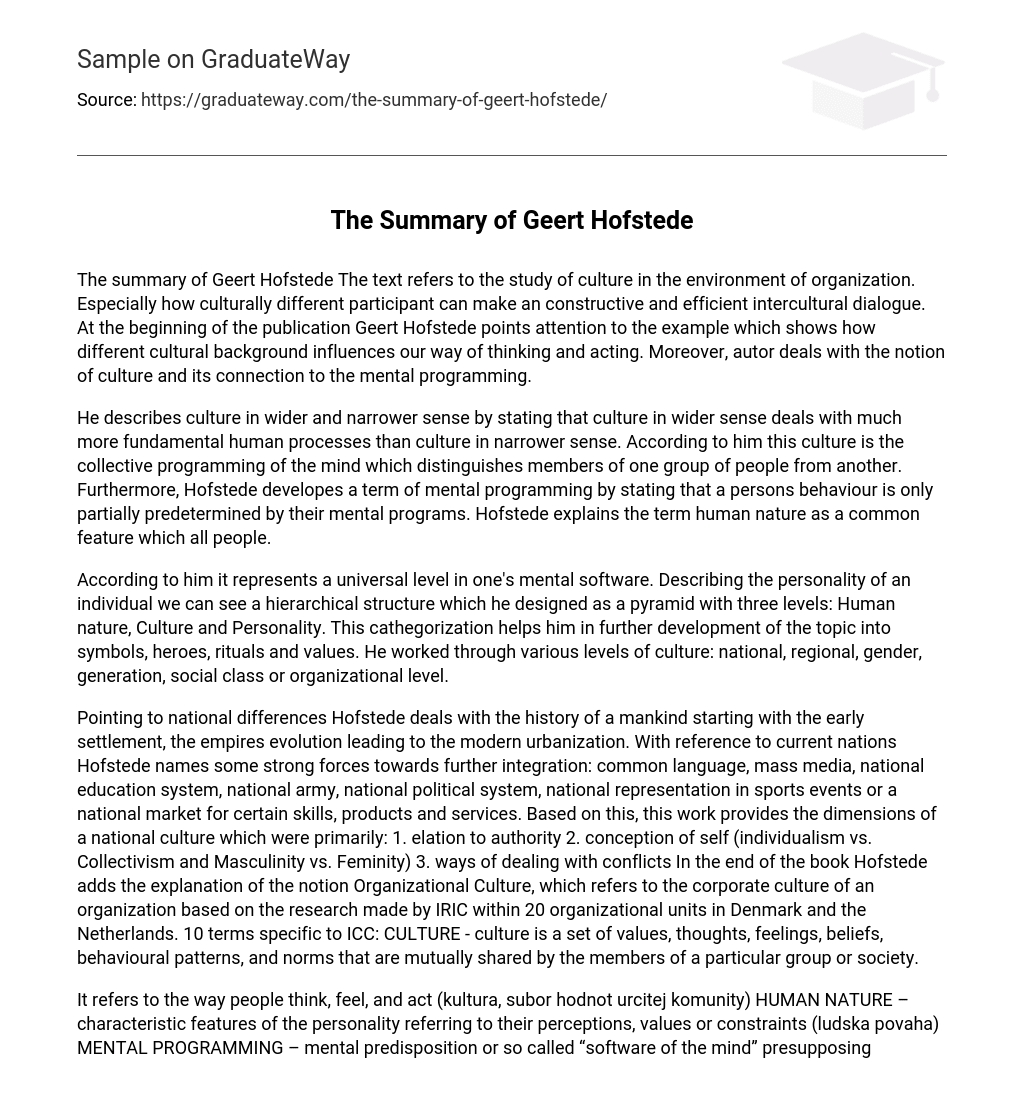The summary of Geert Hofstede The text refers to the study of culture in the environment of organization. Especially how culturally different participant can make an constructive and efficient intercultural dialogue. At the beginning of the publication Geert Hofstede points attention to the example which shows how different cultural background influences our way of thinking and acting. Moreover, autor deals with the notion of culture and its connection to the mental programming.
He describes culture in wider and narrower sense by stating that culture in wider sense deals with much more fundamental human processes than culture in narrower sense. According to him this culture is the collective programming of the mind which distinguishes members of one group of people from another. Furthermore, Hofstede developes a term of mental programming by stating that a persons behaviour is only partially predetermined by their mental programs. Hofstede explains the term human nature as a common feature which all people.
According to him it represents a universal level in one’s mental software. Describing the personality of an individual we can see a hierarchical structure which he designed as a pyramid with three levels: Human nature, Culture and Personality. This cathegorization helps him in further development of the topic into symbols, heroes, rituals and values. He worked through various levels of culture: national, regional, gender, generation, social class or organizational level.
Pointing to national differences Hofstede deals with the history of a mankind starting with the early settlement, the empires evolution leading to the modern urbanization. With reference to current nations Hofstede names some strong forces towards further integration: common language, mass media, national education system, national army, national political system, national representation in sports events or a national market for certain skills, products and services. Based on this, this work provides the dimensions of a national culture which were primarily: 1. elation to authority 2. conception of self (individualism vs. Collectivism and Masculinity vs. Feminity) 3. ways of dealing with conflicts In the end of the book Hofstede adds the explanation of the notion Organizational Culture, which refers to the corporate culture of an organization based on the research made by IRIC within 20 organizational units in Denmark and the Netherlands. 10 terms specific to ICC: CULTURE – culture is a set of values, thoughts, feelings, beliefs, behavioural patterns, and norms that are mutually shared by the members of a particular group or society.
It refers to the way people think, feel, and act (kultura, subor hodnot urcitej komunity) HUMAN NATURE – characteristic features of the personality referring to their perceptions, values or constraints (ludska povaha) MENTAL PROGRAMMING – mental predisposition or so called “software of the mind” presupposing a person to behave a particular way (dusevne predispozicie, naprogramovanie mysle) CULTURAL RELATIVISM – a theory explaining that one culture has no absolute criteria for judging the activities of another culture as “low” or “noble” ((kulturny relativizmus) CULTURAL DIFFERENCES – differences collecting some mutual artefacts from certain cultures and comparing them to the artefacts from another culture (kulturne rozdiely) VALUES – unconsciously acquired patterns of preferred issues in our life (hodnoty) NORMS – the standards for values that exist within a group or category of people (normy) LAYERS OF CULTURE – several layers of mental programming determining the cultural framework (vrstvy kultury) DIMENSIONS OF NATIONAL CULTURE – dimensions dealing with the common features of a particular nation in the notion of culture (dimenzie narodnej kultury) ORGANIZATIONAL CULTURE – the values common for the members of a particular organization usually referring to the company or corporation (fireman kultura) Vocabulary Development: Mental programming (mentalne naprogramovanie), psychological functioning (psychologicky proces), notions (predstavy, pojmy), constraints (obmedzenia), incentives (podnety), cultural relativism (kulturny relativizmus), superfluous (nadbytocny) cumbersome (zbytocne velky, neskladny) ambiguous (dvojznacny, dvojzmyselny, rozporuplny) virtuous (cestny, mravny)





